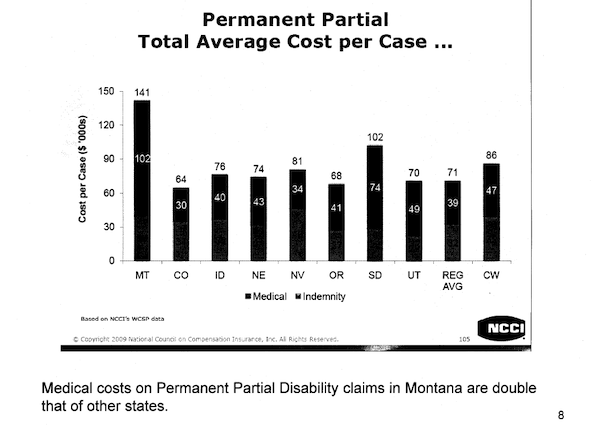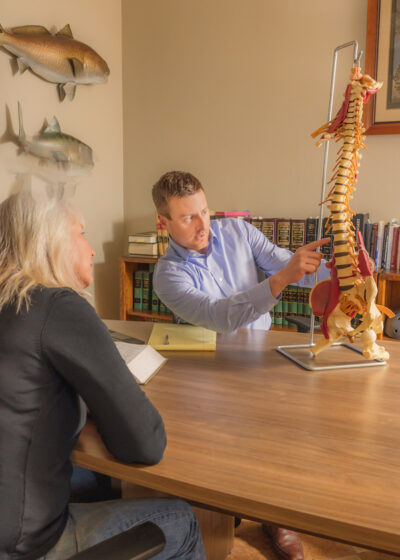Clients are often concerned about the value of their possible work comp settlement. It is a valid concern, as if you find yourself injured and without a job, the work comp settlement might be your only hope to survive financially. No one wants to have a work comp claim, despite the anti-work comp propaganda you hear from insurance companies and uninformed people. For some reason there’s a public perception (driven by insurance propaganda) that people like you with a work comp claim want to be disabled, which is offensive.
If you are one of the unlucky few to suffer a serious work injury, on top of your disability, you will likely find yourself in paycheck-to-paycheck survival mode. Your work comp settlement might be the only thing that gets you through a tough financial period.
(Very) Brief Montana Work Comp Overview
Here’s the rub. Montana work comp settlements are modest, because the laws are conservative. Here’s why.
Montana does indeed have high workers’ compensation premium rates compared to other states. There are a couple reasons for that. First, we have risky jobs in Montana. Our working class jobs have historically been dominated by construction, mining, and logging. These types of jobs are inherently dangerous, and lead to high frequency of injuries. It is somewhat unavoidable. We have a higher frequency of injuries than many other states.
Second, for unclear reasons, Montana health care costs in workers’ compensation claims are much higher than other states. Laws have changed in recent years to curb expenses to some extent, but they still remain high.

Why do you need to know this? Because it sets the stage for your work comp settlement. Because of high premiums, and high health care costs, legislators have cut work comp benefits in other areas. It is unfortunate for the injured worker. High premiums led to disgruntled employers, which led to legislative cuts, and lower overall claim value.
I always give this general background to clients at the outset, so that there isn’t an expectation of a massive amount of money, when it won’t happen. Work comp settlements are relatively modest, and don’t make anyone, including lawyers, rich. That being said, a good lawyer can still make a big difference in many claims to ensure you get the maximum possible work comp settlement, under the case-specific facts.
Work Comp Settlement – Wage Loss and Medical Expenses
The main two factors for most work comp settlements are: 1) Permanent Wage loss Benefits; and 2) Future Medical Benefits. Let’s tackle wage loss benefits first.
Wage Loss Benefits in a Work Comp Settlement
Often the main driver of a work comp settlement is the existence or degree of permanent wage loss benefits. Permanent wage loss benefits are determined once an injured worker reaches maximum medical improvement (aka, medical stability). At that point, a worker falls into one of 3 categories:
1 – A worker who can return to work without wage loss. Not entitled to any permanent wage loss benefits, but may receive an impairment award if the impairment is Class 2 or higher.
2 – Permanent Partial Disability (PPD): A worker who returns to work, but suffers a permanent decrease is wages as a result of the injury. PPD rates are 2/3 of your average pre-injury wage, capped at half of Montana’s average weekly wage. Paid based on a percentage formula under MCA 39-71-703. The formula is based on age, education, impairment, physical restrictions, and degree of wage loss. The percentage is multiplied by the worker’s PPD rate, times 400 weeks. PPD figures often fall within the $20,000-70,000 range, but is based on case specific facts, and critically, your specific PPD rate. It is impossible for an attorney to predict the amount without knowing your specific case.
3. Permanent Total Disability (PTD): A worker who is permanently and totally unable to work. MCA 39-71-702. PTD benefits are 2/3 of you average pre-injury wage, capped at Montana’s average weekly wage. PTD benefits can be paid up through retirement age, defined on receipt or eligibility to receive social security retirement benefits.

A work comp settlement often occurs due to disputes over employability. For instance, an injured worker is often let go by their employer, yet the insurer still argues that the person is employable without any wage loss. In that case, the worker is attempting to get a settlement reflective of the full PPD amount, whereas the insurer is negotiating for less. It depends on the facts as to who is correct, and whether a settlement is even in the workers best interest. If PPD entitlement is crystal clear, an injured worker does not have to settle to get the benefit.
Sometimes there are disputes over whether the worker is employable at all. In those cases the worker will argue for PTD. This often arises with very serious injuries or with aging worker. In these cases, it is often clear that the injured worker cannot perform the time of injury job after an injury, or similar-paying work. In that case, perhaps it is clear that the person is entitled to PPD benefits, but that is not enough. If a person is seriously disabled, or aging, there might be a legitimate argument the person is “unemployable” for all intents and purposes.
Think of a 58 year old car mechanic who has two injured shoulders, and has been a mechanic their entire life. That person cannot be a mechanic, and realistically may not have transferable skills to other employment. Vocational rehabilitation might be an option, but it’s hard to teach an old dog new tricks. The reality is that it is very hard for someone who has been in one profession to upend their life and switch in their 50’s and 60’s.
The PTD argument is important because PTD benefits are paid through social security retirement age. An injured worker might be entitled to years of benefits, as opposed to more limited PPD benefits that are often based only on a year or so of benefits. Also PTD benefits are capped at a much higher amount than PPD benefits, so many injured workers have a higher PTD than PPD rate. A work comp settlement based on PTD is often much more significant than PPD. Work comp settlements are often based on a compromise between PPD and PTD when there is a dispute over employability.
We still cannot predict your wage loss settlement without reviewing your case. In addition to the above employability issues, a huge driver of settlement is your specific wage rate. We wrote a separate post on calculating your rate, but the short story is that it is based on your actual pre-injury wages. A worker earning $200/week before the injury, will have a significantly lower rate than a worker earning $2,000/week. A person with a catastrophic injury may be entitled to modest benefits if the wage rate is low, whereas a lesser-disabled person might get more if their wage rate is significantly higher. It is case specific.
Future Medical Benefits in Work Comp Settlements
Settlement of future medical benefits is the second main driver of settlement value. There is an important caveat – you do not have to settle you future medical benefits. Under Montana law, an injured worker is allowed to only settle wage loss benefits, leaving medical benefits open. It is strongly recommended you speak with a qualified attorney before settling your medical benefits.
Future medical benefits are inherently tough to predict with perfect certainty. Medical conditions can fluctuate, and actual future medical benefits may end up being less or more than the predicted settlement amount. Thus, there are risks for both the worker and the insurer when considering settling medical benefits.
We work with your doctors, and sometime hire experts known as life care planers (LCPs) to help predict future medical needs. In serious cases, it is important to have medical providers involved in the prediction of future medical needs.
There’s also a critical, and relatively new, Montana law that affects future medical benefits. For dates of injury prior to July 1, 2011, medical benefits could remain open on a claim interminably, provided the treatment remained related to the original injury or condition. For dates of injury on or after July 1, 2011, medical benefits in most cases terminated 5 years from the date of injury. MCA 39-71-704(1)(f).
There are a couple exceptions. Medical benefits remain open for those who are permanently and totally disabled, or for repair or replacement of prosthesis. Also, medical benefits can be re-opened for 2 year increments if the medical care is necessary to allow the worker to work or return to work. The re-opening requires a petition to the state medical director.
Many claims fall into the 5 year closure. This is problematic, because when it comes to medical benefit settlement, most insurers assume that the 5 year closure will apply. Oftentimes we have been successful re-opening benefits for at least 2 more years for our clients, yet insurers generally value claims based on the hard 5 year timeline. Depending on your injury and employment, it may or may not be advisable to settle your medical benefits.
Fully Disputed Work Comp Settlements
Some cases that settle are fully disputed, meaning the claim is initially denied. Common reasons for denial are when there is a question whether the injury occurred within the course and scope of employment, when similar pre-existing conditions play a role, occupational diseases involving complicated medical causation.

If a claim is denied, but there is a legitimate argument for compensability, the parties might elect to settle rather than fight it out in Court. Claim value depends on a lot of factors including the amount of medical bills, strength of the compensability case, seriousness of injury, etc. These cases are really tough to value, and often involves a lot of educated-guessing. It is strongly advised that you consult with a lawyer if your claim is denied, and you think the denial might be incorrect.
Summary of Work Comp Settlements
Your work comp settlement depends a number of factors, as set forth above. When you ask a lawyer “what your work comp settlement should be?” and the answer is “it depends,” it isn’t just lawyer talk. It is because it truly does depend on a lot of factors, and every case is different.
Because of all the moving parts, a lawyer can make a big difference in your work comp settlement amount. The system is overall conservative, meaning modest work comp settlements that don’t make anyone, including lawyers rich. Work comp is a grind, but a lawyer can still make a big difference, and we like to help people in need. Please give us a call to discuss your case.

